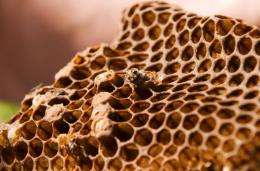British bees tagged to assess pesticide brain damage

British bees will be fitted with radio tags to monitor their movements and see if they are damaged by pesticides, in one of several studies unveiled on Tuesday to probe a decline in pollinating insects.
The research will examine whether agricultural chemicals are damaging bees' brains and affecting their ability to gather food, navigate and perform their so-called "waggle dance" which tells other bees where the best nectar is.
It is one of nine studies in a £10 million (14.7-million-dollar, 12-million-euro) initiative which will look into possible causes of a worrying decline in bees, butterflies and moths in Britain.
Experts involved in the studies said three of Britain's 25 bumblebee species were now extinct and half had suffered declines of up to 70 percent.
This decline has serious implications for agriculture, as insect pollination -- crucial to growing crops -- is thought to be worth £440 million a year to the economy.
"We can take for granted the variety of vegetables, fruits and flowers that we can enjoy every day but some of the insect pollinators on which they rely are in serious decline," Professor Alan Thorpe, chief executive of the Natural Environment Research Council.
"Understanding the complexities of environmental ecosystems is a priority that will help to ensure the survival of pollinators and the benefits they provide."
In the pesticide study, tiny radio frequency identity tags will be fitted to bees and record when they come in and out of the nest, while the insects will also be weighed to see how successful they are at bringing back food.
"Bees have to be able to identify which flowers are the best for nectar, and they learn it by social communication," said Dr Chris Connolly of the University of Dundee, who is leading the study.
They also have to be able to navigate complex flowers and if their learning systems were damaged by pesticides, this could severely hurt their ability to perform these tasks.
Other research being funded by the Insect Pollinators Initiative -- a joint project between research councils, the government and the Wellcome Trust -- looks at diseases threatening honeybees, the impact of changing land use on insects and the best ways to improve pollination diversity, especially in cities.
(c) 2010 AFP

















